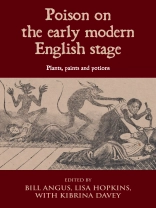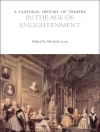Many early modern plays use poison, most famously
Hamlet, where the murder of Old Hamlet showcases the range of issues poison mobilises. Its orchard setting is one of a number of sinister uses of plants which comment on both the loss of horticultural knowledge resulting from the Dissolution of the Monasteries and also the many new arrivals in English gardens through travel, trade, and attempts at colonisation. The fact that Old Hamlet was asleep reflects unease about soporifics troubling the distinction between sleep and death; pouring poison into the ear smuggles in the contemporary fear of informers; and it is difficult to prove. This book explores poisoning in early modern plays, the legal and epistemological issues it raises, and the cultural work it performs, which includes questions related to race, religion, nationality, gender, and humans’ relationship to the environment.
विषयसूची
Introduction
Bill Angus and Lisa Hopkins
Part I: Sources of poison
1 ‘Balms and gums and heavy cheers’: Shakespeare’s poison gardens
Lisa Hopkins
2 Shakespeare and the snakehandlers: venom, vermin and the circulation of eco-social energy in Renaissance drama
Todd Andrew Borlik
3 Shakespeare’s ‘baleful mistletoe’
Susan C. Staub
4 Poisoning and poisonous Black bodies: Egyptian magic on the early modern stage
Nour El Gazzaz
Part II: Poisoners
5 ‘Spit thy poison’: the rhetoric of poison in Marston’s and Webster’s Italianate drama
Yan Brailowsky
6 Poisonous intent, or how to get away with attempted murder on the early modern stage
Anthony Archdeacon
7 ‘Let this deadly draught purge clean my Soul from sin’: poisons and remedies in Margaret Cavendish’s drama
Delilah Bermudez Brataas
8 Poxy doxies and poison damsels: venereal infection and the myth of the venomous woman in early modern literature
Dee Anna Phares
Part III: Victims
9 ‘Thou didst eat my lips’: swallowing passion in William Davenant’s The Tragedy of Albovine
Kibrina Davey
10 ‘The leperous distilment’: authority, informers and the poisoned ear
Bill Angus
11 Playing with poison: murder, proof and confession in early modern revenge
Jessica Apolloni
12 ‘No healthsome air breathes in’: spiritual poison in Romeo and Juliet
Khristian S. Smith
13 ‘Death’s counterfeit’: the art of undying and the Machiavels in The Jew of Malta and Alphonsus, Emperor of Germany
Subarna Mondal
Index
लेखक के बारे में
Lisa Hopkins is Professor of English at Sheffield Hallam University












